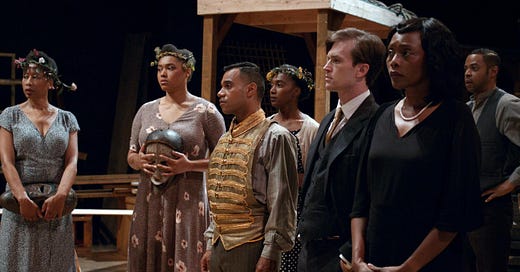Heartland: Voodoo Macbeth
An historically accurate period piece that captures the first success of American director Orson Welles’ career delivering heart, superb acting, and a well-written script.
Click here for Heartland Film Festival showtimes and tickets!
A few years before Orson Welles directed his classic film “Citizen Kane” (1941), he adapted and directed an all-black cast in a production of William Shakespeare’s Macbeth. This was news to me, but fascinating to learn this little bit of history.
Set in Harlem in the 1930s, this fell squarely in the middle of the Harlem Renaissance—a time where African-American arts and culture flourished. Poetry, music, and the performing arts were thriving as black artists sought to express themselves.
So, in 1935 when The Federal Theater Project was established to fund live artistic performances, Harlem was ripe with creativity. The most active chapter to receive this funding was “The Negro Unit” who performed out of the Lafayette Theater in Harlem, New York.
Working for “The Negro Unit” probably didn’t seem like the most welcoming atmosphere for Orson (Jewell Wilson Bridges), since he was comfortably working at a radio station at the time. When consulting with his wife Virginia Welles (June Schreiner), however, she convinced Orson that this type of exposure could bolster his career. Early in the film, before Orson’s work on the play becomes obsessive and alcohol-fueled, Virginia believed that her husband was truly a genius and supported him.
Shortly after agreeing to the position, the pressures faced by Welles start to take a toll on himself and his marriage. And further adding to that complication is pressure that Orson was getting to fire his wife and utilize black actress Rose McClendon (Inger Tudor) as his Lady M.
There is something quite refreshing about a film that can tell a story from years ago, yet have some of the themes parallel some of the current, ongoing struggles of the African-American community. Politicians trying to interfere with their progress, protestors not wanting a “whitewashed” performance, stigma of homosexuality in the black community.
The movie is well-paced and gives many of the other cast members screen time and an opportunity to shine. Maurice (Jeremy Tardy), a bellhop turned actor, stole the screen anytime he was on it. Jack Carter (Gary McDonald), also gave a powerful performance as a drunken actor who floundered his opportunity to be the star of the show.
However you look at it, the star of Voodoo Macbeth was Bridges, whose portrayal of Orson Welles was so well done that credit should go to the actor and three directors (Agazi Desta, Jennifer Frazin, and Morgan Milender).
Small trigger warning for those going to see it: There is an instance of black-face in the film.





